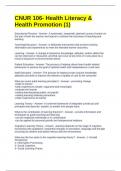CNUR 106- Health Literacy &
Health Promotion (1)
Educational Process - Answer- A systematic, sequential, planned course of action on
the part of both the teacher and learner to achieve the outcomes of teaching and
learning.
Teaching/Instruction - Answer- A deliberate intervention that involves sharing
information and experiences to meet the intended learner outcomes.
Learning - Answer- A change in behaviour (knowledge, attitudes, and/or skills) that
can be observed or measured, and that can occur at any time or in any place as a
result of exposure to environmental stimuli
Patient Education - Answer- The process of helping clients learn health-related
behaviours to achieve the goal of optimal health and independence in self-care.
Staff Education - Answer- The process fo helping nurses acquire knowledge,
attitudes and skills to improve the delivery of quality of care to the consumer.
What are some adult learning principles? - Answer- -promoting change
-relate to learner
-keep experiences simple, organized and meaningful
-motivate the learner
-making learning pleasurable, not painful
-making learning relatively permanent
-relate experiences to learner
Learning Theory - Answer- A coherent framework of integrated constructs and
principles that describe, explain, or predict how people learn.
What is the contribution of learning theories? - Answer- -provide information and
techniques to guide teaching and learning
-can be employed individually or in combination
-can be applied for personal growth and interpersonal relations
Cognitive Learning Theory - Answer- -learning depends on the stage of cognitive
functioning with qualitative, sequential changes in perception, language and thought
occurring as children and adults interact with the environment.
What are the four parts to the cognitive learning theory? - Answer- 1- Gestalt
Perspective
2- Information Processing
3- Social Cognition
4- Social Learning Theory
, Cognitive Learning Theory: Gestalt Perspective - Answer- -perception and the
patterning of stimuli (gestalt) are the keys to learning with each learner perceiving,
interpreting and reorganizing experiences in his/her own way.
-learning occurs through the reorganization of elements to form new insights and
understanding
Cognitive Learning Theory: Information Processing - Answer- -The way individuals
perceive, process, store, and retrieve information from experiences determines how
learning occurs and what is learned
-Organizing information and making it meaningful aids the attention and storage
process; learning occurs through guidance, feedback, and assessing and correcting
errors
Cognitive Learning Theory: Social Cognition - Answer- -An individual's perceptions,
beliefs and social judgements are affected strongly by social interaction,
communication, groups, and the social situation
-Individuals formulate casual explanations to account for behavior that have
significant consequences for their attitudes and actions (attribution theory)
Cognitive Learning Theory: Social Learning Theory - Answer- -To change behavior,
utilize effective role models who are perceived to be rewarded and work with the
social situation and the learner's internal self-regulating mechanisms
-Concepts: role modeling, vicarious reinforcement, self-system, self-regulation
Humanistic Learning Theory - Answer- -Learning occurs on the basis of a person's
motivation, derived from needs, the desire to grow in positive ways, self-concept,
and subjective feeling
-facilitated by caring facilitators and a nurturing environment that encourage
spontaneity, creativity, emotional expression and positive choices
Motivation - Answer- Needs, desire to grow, self-concept
Educator - Answer- Act as facilitator who respects learner
s uniqueness and provides freedom to feel, express and grow creatively
Transfer - Answer- Positive or negative feelings and choices as well as freedom to
learn, promote, or inhibit transfer
Motor Learning - Answer- -useful in addition to theories of psychological learning
-examples: walking, putting on colostomy bag, etc
What are the stages of motor learning? - Answer- 1- Cognitive Stage: learner works
to develop cognitive map
2- Associative Stage: consistent performance, slower gains, fewer errors
3- Autonomous Stage: achieving advanced level
What are the variables involved in motor learning? - Answer- 1- Pre-practice:
motivation, attention, goal setting, modeling, demonstations
2- Practice: massed vs. distributed, whole vs. part, random vs. blocked, guidance vs.
discovery




